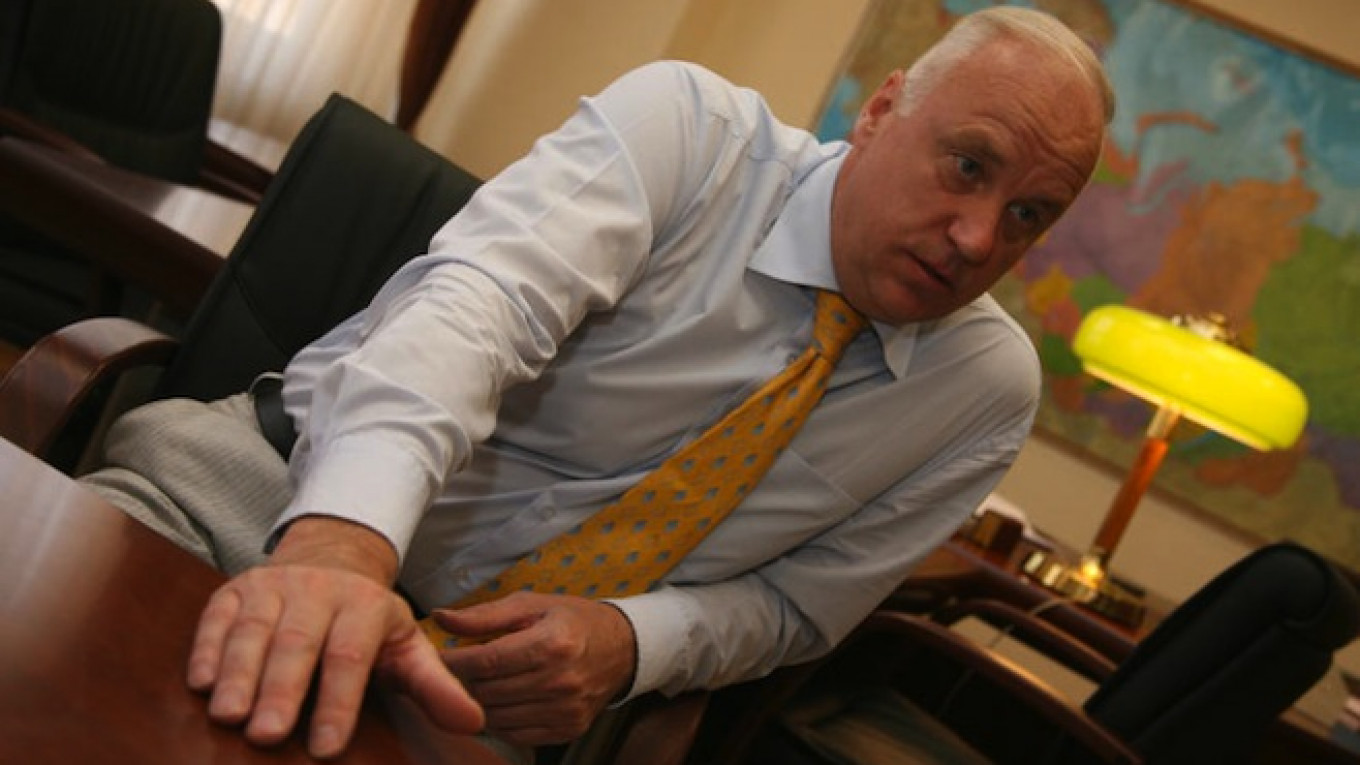
If Russian liberals think they've got it bad, they should stop for a moment to consider the plight of Alexander Bastrykin.
Formally, Bastrykin's role as head of Russia's Investigative Committee is to investigate crime while simultaneously competing for resources and influence with police and prosecutors. By night, the ludicrousness of that position — evidenced by the running battle between his committee and the federal prosecutors over whether to remand businessman Dmitri Kamenshchik — evidently leaks into his alter-ego as absurdist political theorist.
Little did he know he'd be have competition in the form of Ella Pamfilova, the human rights activist turned head of the Russian Central Election Commission.
Why Bastrykin felt moved to enter into the public fray this week, penning an essay in the Kommersant Vlast magazine that seemed designed to confirm every Russian liberal's worst fears, we cannot know.
Perhaps, as some have suggested, he was lobbying for new powers to counter sedition online, in universities and elsewhere. It's unlikely, though, that the pages of a semi-liberal magazine are the best venue for that. Maybe, after the recent shakeup in Russia's law enforcement universe, he felt unsure of his position and decided to try to prove his loyalty and usefulness with a declaration of ideological fervor. That tack didn't work so well for ousted railways chief Vladimir Yakunin.
What we do know, however, is that Bastrykin said nothing new. The proposals to more tightly control flows of information and capital have been around for years. Tax police and Roskomnadzor already have most of the extra-judicial powers that Bastrykin says are so critical. Similarly, authorities clearly see ideology and history as a battleground, and have long argued that their opponents are backed by the West. And the fact that Moscow's enforcers have little patience for the niceties of constitutionalism should, in 2016, come as a surprise to no one.
And so, unable or unwilling to tell us anything we didn't already know, Bastrykin followed in the footsteps of countless preachers who have been abandoned by their muse: He simply said it louder and brasher.
What caught readers' attention was Bastrykin's call to "stop playing at false democracy" and abandon "pseudo-liberal values." Like Donald Trump in the United States, we're not surprised Bastrykin thinks these things, but we allow ourselves a moment of righteous indignation when he actually says them.
That's the mirror image of liberals' reaction to Pamfilova. Shortly after Bastrykin published his thesis, Pamfilova told opposition candidate Ivan Zhdanov — who is facing prosecution on evidently trumped up charges — that he should have "known what would happen when you went into politics." That a Russian election official would say such a thing is, alas, par for this particular course; the surprise is that Pamfilova, who spent her life in the human rights community, might actually think it.
Liberals' doubts about Pamfilova intensified when she initially turned a blind eye to obvious fraud around local council elections in the affluent Moscow suburb of Barvikha. Zhdanov and others supported by Alexei Navalny's Party of Progress decided to contest the elections as an early test of how the Kremlin — and Pamfilova — would manage the upcoming Duma vote. Presented with evidence of the usual repertoire of early-vote ballot stuffing and other forms of manipulation, Pamfilova offered to pass the allegations on to Yury Chaika, the prosecutor general whose family's business dealings have been subject to a recent investigation by Navalny and Zhdanov. The irony was lost on no one.
Navalny eventually yanked his candidates from the race, passing judgment on Pamfilova in the process. No doubt spurred on by the criticism, the next day the Central Election Committee demanded that local officials cancel the vote; what will happen next remains unclear.
Imagine Bastrykin's frustration: Here he was, setting everything up for a good-cop-bad-cop routine, and Pamfilova shows up, wanting to play the bad cop too. But the comedy masks a deeper tragedy: When there are no other words to say and no thoughts to think, the absurdity of it all becomes banal, boring, and the players, trapped in their roles, tire of the masks.
Sam Greene is a political analyst.
A Message from The Moscow Times:
Dear readers,
We are facing unprecedented challenges. Russia's Prosecutor General's Office has designated The Moscow Times as an "undesirable" organization, criminalizing our work and putting our staff at risk of prosecution. This follows our earlier unjust labeling as a "foreign agent."
These actions are direct attempts to silence independent journalism in Russia. The authorities claim our work "discredits the decisions of the Russian leadership." We see things differently: we strive to provide accurate, unbiased reporting on Russia.
We, the journalists of The Moscow Times, refuse to be silenced. But to continue our work, we need your help.
Your support, no matter how small, makes a world of difference. If you can, please support us monthly starting from just $2. It's quick to set up, and every contribution makes a significant impact.
By supporting The Moscow Times, you're defending open, independent journalism in the face of repression. Thank you for standing with us.
Remind me later.


